|
|
|
Sort Order |
|
|
|
Items / Page
|
|
|
|
|
|
|
| Srl | Item |
| 1 |
ID:
088356
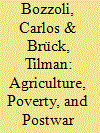

|
|
|
|
|
| Publication |
2009.
|
| Summary/Abstract |
This article analyzes the effects of household-level activity choices on farm household welfare in a developing country affected by mass violent armed conflict. The study uses household survey data from postwar Nampula and Cabo Delgado provinces in Northern Mozambique capturing many activity choices, including market participation, risk and activity diversification, cotton adoption, and social exchange, as well as income-and consumption-based measures of welfare. The study advances the literature on postwar coping and rural poverty at the micro level by estimating potentially endogenous activity choices and welfare outcomes using instrumental variables. The study finds that increasing the cultivated area and on-farm activities enhances postwar welfare of smallholders exploiting wartime survival techniques. Subsistence farming reduces income but does not affect consumption, while market participation has positive welfare effects. This suggests that postwar reconstruction policies should encourage the wartime crop mix but offer enhanced marketing opportunities for such crops. Cotton adoption, which was promoted by aid agencies in the postwar period, reduces household welfare per capita by between 16% and 31%, controlling for market access. This contradicts previous studies of postwar rural development that did not control for the war-related endogeneity. Hence, addressing the potential endogeneity of activity choices is important because the standard regression approach may lead to biased estimates of the impact of activity choice on welfare, which in turn may lead to biased policy advice. The article discusses and contextualizes these findings, concluding with a discussion of suitable pro-poor reconstruction policies for national governments and donors.
|
|
|
|
|
|
|
|
|
|
|
|
|
|
|
|
| 2 |
ID:
123761
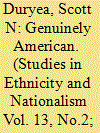

|
|
|
|
|
| Publication |
2013.
|
| Summary/Abstract |
Especially during the turbulent years of the immediate postwar period, Croatian-Americans found expediency in positioning their ethnic culture within the realm of acceptable white manhood and peaceful civilization. To be accepted was to be white, or to try to be white. Accordingly, Croatian-Americans attempted to qualify themselves as authentic whites whose ethnicity meshed perfectly with the American way. This study examines the Croatian Fraternal Union's Zajednicar newspaper to demonstrate that during the postwar period, which was characterized by converging anxieties over disintegrating gender roles, acceptable whiteness, as structured by Protestant old immigrant Americans, and the perceived communist threat, Croatian-Americans in Pittsburgh qualified themselves as authentically white and genuine American men and women to escape accusations of subversion.
|
|
|
|
|
|
|
|
|
|
|
|
|
|
|
|
| 3 |
ID:
118284
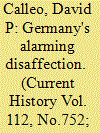

|
|
|
|
|
| Publication |
2013.
|
| Summary/Abstract |
Germany's postwar leaders played a critical role in creating the European Union. Their successors need to remember that federalism benefits the strong as well as the weak.
|
|
|
|
|
|
|
|
|
|
|
|
|
|
|
|
| 4 |
ID:
086640
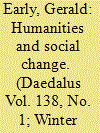

|
|
|
|
|
| Publication |
2009.
|
| Summary/Abstract |
The mere exercise of reading the text as it really is will make the reader moral and wise in a direct way that no systemic body of dogmatic teaching can rival ...The real point of close reading is that it produces the right sort of person-a person of evident worth.
|
|
|
|
|
|
|
|
|
|
|
|
|
|
|
|
| 5 |
ID:
174004
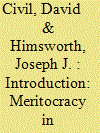

|
|
|
|
|
| Summary/Abstract |
Sixty years after its publication, Michael Young’s The Rise of the Meritocracy remains one of the most important texts for understanding the changing intellectual politics of postwar Britain. Young’s fictional vision of a meritocratic society explores the consequences of a society where each citizen is judged according to the formula ‘I.Q. + Effort = Merit’. The successful meritocrats hoard ever‐greater rewards for themselves, crystallising into a rigid and repressive elite who rule over an increasingly powerless and depressed underclass. While the concept has evolved and adapted, the language of meritocracy is one of the great survivors of postwar British politics. In an age characterised by the rise of populist leaders and movements, as well as a backlash against educated ‘liberal elites’, revisiting, reinterpreting and re‐evaluating Young’s influential satire and the central place the concept of meritocracy occupies in the history of postwar Britain has never been more important.
|
|
|
|
|
|
|
|
|
|
|
|
|
|
|
|
| 6 |
ID:
190967
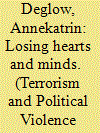

|
|
|
|
|
| Summary/Abstract |
Postwar countries often experience high levels of crime. A frequent explanation is that these countries exhibit inefficient and illegitimate state security apparatuses that cannot enforce law and order, and that contribute to an environment conducive to crime. Theoretical arguments outlining how an environment conducive to crime comes about as consequences of armed conflict have remained generic and empirical evidence is scant. Building on theoretical insights from the micro dynamics of civil wars, counterinsurgency policing and environmental criminology, this study makes a contribution by theoretically developing and empirically exploring how local conflict dynamics in insurgent strongholds shape police-community relations in a way that undermines the extent to which the police can handle crime in a postwar context. The suggested causal process is explored in the context of West Belfast (Northern Ireland) from 1969–2008. The analysis indicates overall support for it, though with important nuances.
|
|
|
|
|
|
|
|
|
|
|
|
|
|
|
|
| 7 |
ID:
093205
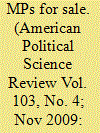

|
|
|
|
|
| Publication |
2009.
|
| Summary/Abstract |
Many recent studies show that firms profit from connections to influential politicians, but less is known about how much politicians financially benefit from wielding political influence. We estimate the returns to serving in Parliament, using original data on the estates of recently deceased British politicians. Applying both matching and a regression discontinuity design to compare Members of Parliament (MPs) with parliamentary candidates who narrowly lost, we find that serving in office almost doubled the wealth of Conservative MPs, but had no discernible financial benefits for Labour MPs. Conservative MPs profited from office largely through lucrative outside employment they acquired as a result of their political positions; we show that gaining a seat in Parliament more than tripled the probability that a Conservative politician would later serve as a director of a publicly traded firm-enough to account for a sizable portion of the wealth differential. We suggest that Labour MPs did not profit from office largely because trade unions collectively exerted sufficient control over the party and its MPs to prevent members from selling their services to other clients.
|
|
|
|
|
|
|
|
|
|
|
|
|
|
|
|
| 8 |
ID:
144391
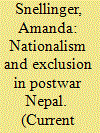

|
|
|
|
|
| Summary/Abstract |
Nepal’s new constitution was supposed to cap a momentous decade that saw the end of the monarchy and civil war. But identity politics and economic discontent have called national unity into question.
|
|
|
|
|
|
|
|
|
|
|
|
|
|
|
|
| 9 |
ID:
179068
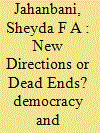

|
|
|
|
|
| Summary/Abstract |
Amidst the many surreal moments we have witnessed in U.S. politics since November 2016, you would not be blamed for having missed one of the more curious—if outwardly boring—ones. This episode came with no tweets, tantrums, or tirades; indeed, in an unusual twist, it did not even traffic in the casual degradation of women or people of color. Instead, it had the refreshing appearance of a quotidian Washington scene.
|
|
|
|
|
|
|
|
|
|
|
|
|
|
|
|
| 10 |
ID:
142983
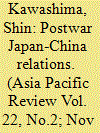

|
|
|
|
|
| Summary/Abstract |
This article attempts to take a new look at postwar Japan-China relations from the perspective of reconciliation. In contrast to the Murayama and Koizumi statements, one key phrase characterized both the August 14, 2015 Abe Statement and the report of the 21st Century Advisory Panel, which had been submitted earlier to the government: that key phrase is “postwar reconciliation.”
|
|
|
|
|
|
|
|
|
|
|
|
|
|
|
|
| 11 |
ID:
103840
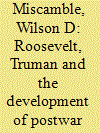

|
|
|
|
|
| Publication |
2009.
|
| Summary/Abstract |
After its victory in World War II, it was clear that United States should move beyond the disastrous policies of the 1930s, but it was less clear how. Ultimately, a lasting postwar strategy was forged under President Truman. Appreciating how Truman moved well beyond Roosevelt's guiding assumptions is essential to understanding the evolution of American grand strategy. One sees that wartime planning and grand strategy formulation can prove quite inadequate for dealing with postwar challenges. An administration cannot be locked into assumptions, but must constantly test them. Thus, the Truman administration eventually developed and adopted containment and moved far beyond FDR's approach. More substantively, the fundamental geopolitical lesson of World War II and the early Cold War was that the United States must assume the essential balancing role relative to other major powers.
|
|
|
|
|
|
|
|
|
|
|
|
|
|
|
|
| 12 |
ID:
160896
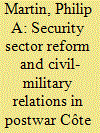

|
|
|
|
|
| Summary/Abstract |
ON JUNE 30, 2017, THE UNITED NATIONS OPERATION in Côte d’Ivoire (ONUCI) reached the end of its mandate after fourteen years of peacekeeping operations. UN officials and Ivorian national leaders framed ONUCI’s departure as another positive step in the country’s postwar recovery, declaring that the return to peace was ‘irreversible’.1 In some ways, this enthusiasm appeared warranted. Since the end of the Second Ivorian Civil War in 2011, which culminated in the arrest of former President Laurent Gbagbo by rebel troops formerly known as the Forces nouvelles, the country has experienced rapid economic recovery: GDP growth averaged 9 percent from 2012 to 2016.2 Government and UN officials have touted the success of the country’s disarmament, demobilization, and reintegration (DDR) programme, which officially processed over 60,000 ex-combatants between 2012 and 2015.3 Within the country’s armed forces, officials point to the integration of former rebels and pro-Gbagbo elements within unified military units as further evidence that Côte d’Ivoire is a model of peacebuilding and security sector reform to be emulated by Africa’s other conflict-torn states.4
|
|
|
|
|
|
|
|
|
|
|
|
|
|
|
|
| 13 |
ID:
179025
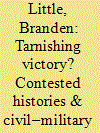

|
|
|
|
|
| Summary/Abstract |
As the First World War came to an end, the U.S. Navy's leadership engaged in a bitter fight over the “lessons” of the war. Admiral William S. Sims and Secretary of the Navy Josephus Daniels fought against each other's irreconcilable positions. Sims argued that the Navy Department's inexpert civilian secretary had hamstrung mobilisation, impeded the anti-submarine campaign, and ostracised capable officers in favour of friends upon whom he bestowed medals. Daniels countered that his administration had masterfully responded to the crisis of war. The Navy's record, Daniels insisted, could best be summarised as “a great job greatly done.” Only disloyal nit-pickers could find fault in its accomplishments. The Sims-Daniels controversy raged in congressional hearings, the press, and in partisan histories written by the protagonists. The heart of the dispute and its uncertain resolution rested in radically different understandings of American civil–military relations, naval heroism, and the determinants of victory.
|
|
|
|
|
|
|
|
|
|
|
|
|
|
|
|
|
|
|
|
|